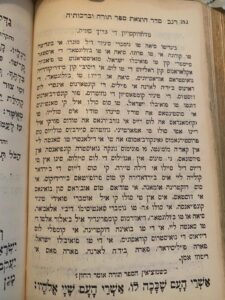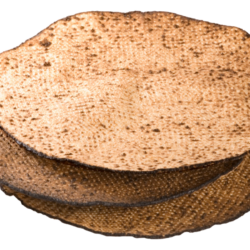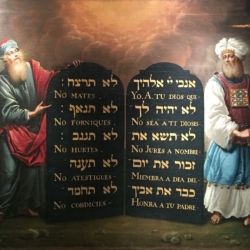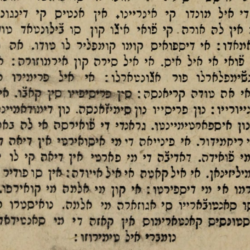| Source (Aramaic) | Translation (English) | Translation (Ladino) | Translaton (Romanized Ladino) | Translation of Ladino (English) |
|---|---|---|---|---|
בְּרִיךְ שְׁמֵהּ דְּמָרֵא עָלְמָא, בְּרִיךְ כִּתְרָךְ וְאַתְרָךְ׃ |
Blessed be the name of the Master of the Universe, blessed be Your crown and Your place. |
בינדיטו סיאה טו נומברי סיניור דיל מונדו, אי בינדיטה טו קורונה אי טו טרונו. |
Bendito sea Tu nombre, Senyor del Mundo, i bendita Tu korona i Tu trono. |
Blessed be the name of the Master of the Universe, blessed be Your crown and Your throne. |
יְהֵא רַעֲוָא קֳדָמָךְ דְּתוֹרִיךְ לָן חַיִּין בְּטִיבוּתָא, וְלֶהֱוֵי אֲנָא פְקִידָא בְּגוֹ צַדִּיקַיָּא, לְמִרְחַם עָלַי וּלְמִנְטַר יָתִי וְיַת־כׇּל־דִּי־לִי וְדִי־לְעַמָּךְ יִשְׂרָאֵל. |
May it be willed before You to extend our lives in goodness, and recall me Your servant among the righteous, to have mercy on me and guard me and all that is mine and that is Your people Israel’s. |
סיאה או דﬞייו, טו בﬞולונטאדﬞ, די דארנוס בﬞידﬞה לארגה אי פﬞיליס, די קונטארנוס אינטרי לוס זﬞוסטוס, די טיניר קומפאסייון די נוזוטרוס, פור קונסירבﬞארנוס זﬞונטו טו פואיבﬞלו ישראל. |
Sea, o Diyo, Tu voluntað, de darnos viða larga i felis, de kontarnos entre los djustos, de tener kompasiyon de nozotros, por konservarnos djunto Tu puevlo Yisrael. |
May it be Your will, O God, to give us long and happy life, to count us among the righteous, to have compassion on us, to save us and Your people Israel. |
אַנְתְּ הוּא זָן לְכֹלָּא וּמְפַרְנֵס לְכֹלָּא, אַנְתְּ הוּא שַׁלִּיט עַל כֹּלָּא, אַנְתְּ הוּא דְשַׁלִּיט עַל מַלְכַיָּא וּמַלְכוּתָא דִּילָךְ הִיא. |
You feed all and provide for all, You are the ruler of all, You are who rules over sovereigns, and sovereignty is Yours. |
טו סוס סולו איל קי מאנטייניס אי סוסטינטאס אה טודﬞו סיינדו טודﬞו איס טולייו, טו )קו(מאנדאס אה לוס רייס אי גורבﬞירנאס אה טודﬞוס פורקי איל ריינו אטי סולו טי אפארטייני. |
Tu sos solo el ke mantienes i sustentas a toðo siendo, toðo es Tuyo, Tu (ko)mandas a los reyes i gurvirnas a toðos porke el reyno aTi solo Ti apartiene. |
You are alone the one who mantains and sustains all being, all is Yours, You command the kings and govern all, for government is Yours and belongs only to You. |
אֲנָא עַבְדָּא דְקֻדְשָׁא בְּרִיךְ הוּא דְּסָגִידְנָא קַמֵּהּ וּמִקַּמֵּי דִּיקַר אוֹרַיְתֵהּ בְּכׇל־עִדָּן וְעִדָּן. |
I am a servant of the Blessed Holy One, so I bow before God and before the honor of God’s law at all times. |
נוזוטרוס סיירבﬞוס טולייוס נוס פרוסטירנאמוס (אינקורבﬞאמוס) אה טי אי דילאנטרי טו סאנטה ליי אין קאדﬞה מומינטו. |
Nozotros siervos Tuyos nos prosternamos (enkorvamos) a Ti i delantre Tu santa ley en kaða momento. |
We serve You, we prostrate (bend down) to You and before Your holy law in every moment. |
לָא עַל־אֱנָשׁ רָחִיצְנָא וְלָא עַל־בַּר־אֱלָהִין סָמִיכְנָא, אֶלָּא בֶּאֱלָהָא דִשְׁמַיָּא, דְּהוּא אֱלָהָא קְשׁוֹט וְאוֹרַיְתֵהּ קְשׁוֹט וּנְבִיאוֹהִי קְשׁוֹט, וּמַסְגֵּא לְמֶעְבַּד טַבְוָן וּקְשׁוֹט׃ |
Not upon man do I trust, nor upon the divine beings do I rely, but on the God of Heaven, who is a true God, whose law is true, and whose prophets are true, and to whom repeatedly does goodness and truth. |
נו פונימוס נונקה נואיסטרה קונפﬞיאנסה אין פירסונאס, ני מינוס אין אנזﬞילוס די לוס סיילוס, סינו אין טו דייוס דיל סיילו אי דילה טיירה , קי סוס דייוס די בﬞירדאר קולייה ליי איס בﬞירדאדירה קי טוס פרופﬞיטאס בﬞירידיקוס, אי סוס דוקטרינה אומאנה, אי טודﬞוס טוס אובﬞראס סון בואינאס אי זﬞוסטאס. |
No ponemos nunka nuestra konfiansa en personas, ne menos en andjelos de los sielos, sino en Tu Diyos del sielo i della tiera, ke sos Diyos de verdar kuya ley es verdadera ke Tus profetas veridikos, i sus doktrina umana, i toðos Tus ovras son buenas i djustas. |
We cannot trust in people, nor in the angels of heaven, but only in You, God of Heaven and of earth, who is God of truth, whose law is truthful, that Your prophets are trusted, and whose doctrine is humane, and all Your works are good and righteous. |
בֵּהּ אֲנָא רָחִיץ, וְלִשְׁמֵהּ קַדִּישָׁא יַקִּירָא אֲנָא אֵמַר תֻּשְׁבְּחָן. |
In God I trust, and in the holy and honored name I say praises. |
איס קין טי סולו קי איל אומברי פואידי טיניר קונפﬞיאנסה, אי סולו אה טו נומברי סאנטיסימו דיבﬞי אלאבﬞאר. |
Es kon Ti solo ke el ombre puede tener konfiansa, i solo a Tu nombre santisimo deve alavar. |
It is in You alone that man can place trust, and only to Your holiest name say praises. |
יְהֵא רַעֲוָא קֳדָמָךְ דְּתִפְתַּח לִבָּאִי בְּאוֹרַיְתָך, וְתַשְׁלִים מִשְׁאֲלִין דְּלִבָּאִי וְלִבָּא דְכׇל־עַמָּךְ יִשְׂרָאֵל, לְטַב וּלְחַיִּין וְלִשְלָם, אָמֵן׃ |
May it be willed before You to open my heart to Your law, and to fulfill the desires of my heart and the heart of all Your people Israel, for goodness, and for life, and for peace, amen. |
סיאה או טו בﬞולונטאדﬞ, די אזירמוס קומפרינדיר איל בﬞאלור אלטו די טו סאנטה ליי, אי די טו בואינה דוקטרינה, אי קומפלי לוס דיזיאוס די נואיסטרוס קוראסוניס, אי די טו פואיבﬞלו ישראל, פארה פﬞיליסידאדﬞ, פארה בﬞידﬞה לארגה, פארה פאס אי ריפוזו אמן. |
Sea o Tu voluntað, de azermos komprender el valor alto de Tu santa ley, i de Tu buena doktrina, i kumple los dezeos de nuestros korasones, i de Tu puevlo Yisrael, para felisidað, para viða larga, para pas, i ripozo amen. |
Oh, may it be Your will to let us understand the great value of Your holy law, and of Your good doctrine, and fulfill the desires of our hearts, and of Your people Israel, for happiness, for long life, for peace, and respond amen. |
This is a Ladino translation of “Brikh Shmeih d’Marei Alma” (Zohar II 206a) as found in the siddur El Nuevo Avodat haShanah (Yaaqov Mosheh Ḥai Altarats, Belgrade 1904), p.252. We are not certain whether the translation is by Altarats himself or whether this Ladino translation was included by him from an earlier generation of Eastern Sefaradi siddurim containing a Ladino Brikh Shmeih. More on this siddur can be gleaned from Limmud Seattle presenter, Al Maimon. Many thanks to Naomi Klionsky for brining this work to our attention. –Aharon Varady
In his Encyclopedia of Jewish Prayer (1993), Macy Nulman writes the following.
Berikh Shemayh [is] a kabbalistic prayer written in Aramaic and recited on weekdays, Sabbath, and festivals in most congregations before removing the Torah scroll from the ark. The prayer, introduced into the liturgy by Rabbi Isaac Luria (Ari), is quoted verbatim from the Zohar, Parashat Vayakhayl. Its composition, according to the Zohar, is attributed to Rabbi Shimon bar Yohai of the second century, who said, “When the Torah is taken out in public to be read therefrom, the heavenly gates of mercy open and Divine love awakens; therefore it is fitting one should recite Berikh Shemayh [‘Praised be the Name’].”
Berikh Shemayh was first prescribed in Italy in 1540 as an individual prayer. From about 1599 the prayer was used in other rituals,[1] Moses ibn Makhir of Safed, Seder Hayom, Kavanot Shayni Vehamishi (Venice: Mefitzay Or, 1599). and it was finally adopted into the Siddur, first for the Sabbath and later also for weekdays.[2] B.S. Jacobson quoting A. Berliner from his Rand-bemerkungen in The Sabbath Service (Tel Aviv: “Sinai” Publishing, 1981), p. 256. Another opinion is that its acceptance into the liturgy came about when the Ari came to Safed and the prayer was taken into the ritual in Israel, Syria, Egypt, and Turkey. Later it spread to Ashkenazic communities.[3] Keter Shem Tob, vol. I, p. 237.
In some Ashkenazic (German) communities, Berikh Shemayh is omitted on weekdays as well as on Sabbath;[4] Baer, Siddur Avodat Yisrael, p. 122. in certain communities it is optional.[5] Cf. The Hirsch Siddur (New York: Feldheim Publishers, 1969), p. 181; cf. also J. H. Hertz, The Authorized Daily Prayer Book (New York: Bloch Publishing Company, 1948), p. 475. In synagogues following Minhag Poland, it is recited every time the Torah is removed from the ark. In Occidental Sephardic synagogues Berikh Shemayh is not said on weekdays; it is optional on Sabbath and festivals.[6] David De Sola Pool, Book of Prayer (New York: Union of Sephardic Congregations, 1974), pp. 82, 83, 209; cf. also David De Sola Pool, Prayers for the Festivals (New York: Union of Sephardic Congregations, 1963), p. 214. In the London-Amsterdam synagogues it is omitted on Sabbath. In Israel, Syria, Turkey, and Egypt it is said on Sabbath (Shaḥarit and Minḥah) and festivals. Many prayer books have an English or Hebrew translation of the Aramaic prayer, and Sephardim in Turkey even recite it in Ladino.[7] Keter Shem Tob, vol. 1, pp. 236, 237.
Reciting Berikh Shemayh on weekdays and/or on Sabbath and festivals grew out of the various opinions based on the Magayn Avraham,[8] OH, 282:1; cf. also Hayyim Joseph David Azulai (HIDA), Maḥazik Berakhah, 282:2. who ruled that it should be said on Sabbath only, and the Ba’ayr Haytayv 282:1 and P’ri Megadim 34:6, who decided it should be said both on Sabbath and weekdays.
Source(s)
Notes
| 1 | Moses ibn Makhir of Safed, Seder Hayom, Kavanot Shayni Vehamishi (Venice: Mefitzay Or, 1599). |
|---|---|
| 2 | B.S. Jacobson quoting A. Berliner from his Rand-bemerkungen in The Sabbath Service (Tel Aviv: “Sinai” Publishing, 1981), p. 256. |
| 3 | Keter Shem Tob, vol. I, p. 237. |
| 4 | Baer, Siddur Avodat Yisrael, p. 122. |
| 5 | Cf. The Hirsch Siddur (New York: Feldheim Publishers, 1969), p. 181; cf. also J. H. Hertz, The Authorized Daily Prayer Book (New York: Bloch Publishing Company, 1948), p. 475. |
| 6 | David De Sola Pool, Book of Prayer (New York: Union of Sephardic Congregations, 1974), pp. 82, 83, 209; cf. also David De Sola Pool, Prayers for the Festivals (New York: Union of Sephardic Congregations, 1963), p. 214. |
| 7 | Keter Shem Tob, vol. 1, pp. 236, 237. |
| 8 | OH, 282:1; cf. also Hayyim Joseph David Azulai (HIDA), Maḥazik Berakhah, 282:2. |

“בְּרִיךְ שְׁמֵהּ דְּמָרֵא עָלְמָא | B’rikh Shmeih d’Marei Alma (Bendito sea Tu nombre, Senyor del Mundo), Ladino translation from the siddur El Nuevo Avodat haShanah (1904)” is shared through the Open Siddur Project with a Creative Commons Attribution-ShareAlike 4.0 International copyleft license.










Leave a Reply